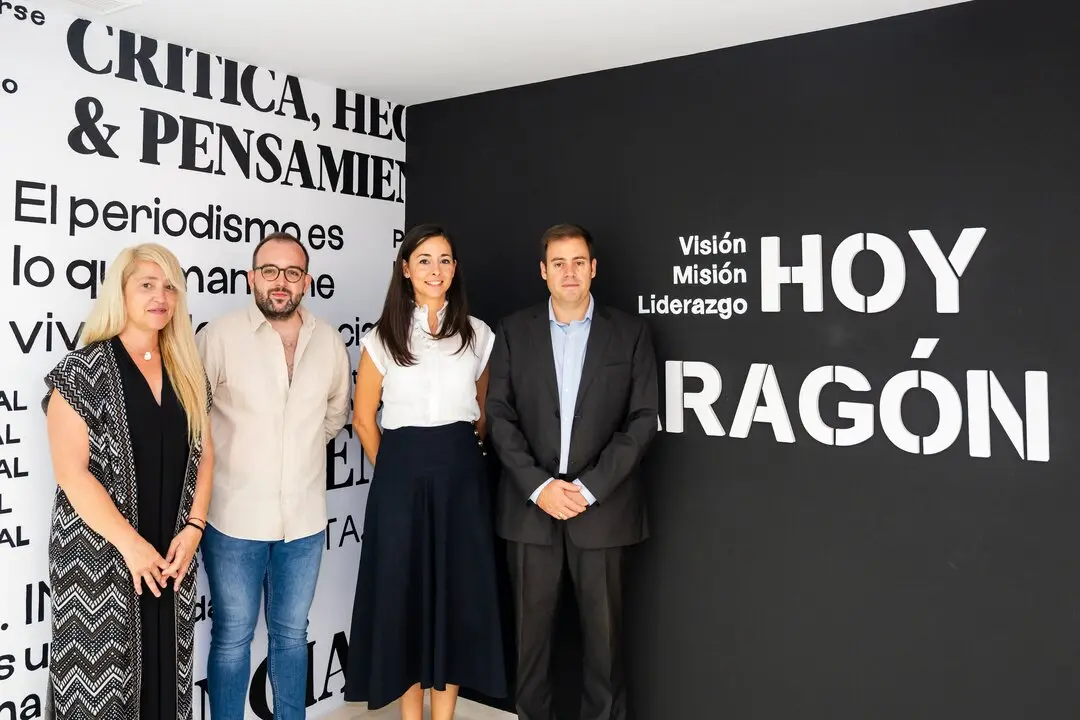Ana Laín, Director of Circular Economy at Grupo Querqus; César Fernández, Managing Director of ARPA; María García, Head of Fluid Dynamics Systems for Energy and Climate (ITA); and Sergio Fernández, Product Manager and Head of Sustainability at Sphere-Spain, participated in the meeting.

As part of the especial sobre descarbonización organizado por HOY ARAGÓN, representatives from various companies and research centres highlighted circularity, innovation and collaboration as drivers for progress towards climate neutrality.
The debate was attended by Ana Laín, Director of Circular Economy at Grupo Querqus, César Fernández, Managing Director of ARPA, María García, Head of Fluid Dynamics Systems for Energy and Climate (ITA), and Sergio Fernández, Product Manager and Head of Sustainability at Sphere-Spain.
At the round table, which focused on the challenges, opportunities and collaboration between business, technology and circularity, the speakers agreed that the biggest obstacle to decarbonisation is not technological or financial, but mainly cultural.
‘The technology exists, and the costs can be absorbed if you view them as a long-term investment. For us, the challenge lies in changing the business mindset: transforming the business model to one that includes investing in decarbonisation, especially for small and medium-sized enterprises,’ said Ana Laín, Director of Circular Economy at Grupo Querqus.
Along the same lines, Sergio Fernández, from Sphere, emphasised that ‘the challenge is multifactorial, but the lack of culture is very noticeable in companies' objectives. According to one study, 38% of companies have sustainability plans, but 92% use them only for marketing purposes.’
ARPA's managing director, César Fernández, defended the importance of internal conviction: ‘The key is to believe that investing in sustainable technologies will give you a competitive edge and enable you to develop new products.’ In the specific case of Arpa, the company has an R&D investment policy focused primarily on green hydrogen.
For her part, María García, head of the fluid-dynamic systems line for Energy and Climate at the ITA, clarified that ‘the degree of technological maturity for decarbonisation varies because there are sectors that are more difficult to decarbonise, where there is considerable scope for technological development, and that is where we at the ITA are working.’
DECARBONISATION AS A BUSINESS OPPORTUNITY
The speakers also shared examples of how sustainability already generates added value. Grupo Querqus is circular economy from the ground up, based on the recovery and repair of pallets, but its focus has gone further and it can now boast of being zero waste. ‘What we can't repair, we turn into a by-product, sometimes for ourselves and sometimes through industrial symbiosis with other companies, selling it to them so that they can use the waste to make other products,’ says Laín.
As an energy-intensive company, Sphere has focused on making all the energy it consumes 365 days a year green: ‘We have a solar farm that generates 15% of the energy we consume daily,’ explained Fernández. The company also bases its model on compostable plant-based materials as an alternative to petrochemicals, which they use, reuse and then return to the earth in the form of fertiliser.
‘We still don't have a brown line that allows us to be the driving force behind decarbonisation at the pace it should be going. There is a lack of public awareness and the right and informed infrastructure for that awareness to be successful,’ Sergio noted.
At ARPA, the commitment to decarbonisation focused on green hydrogen as a solution for the defence sector, until the complete cycle was developed. ‘We have the complete hydrogen cycle and the capacity to guide this development wherever it is needed,’ says the CEO. Arpa is currently taking its hydrogen solutions to other sectors such as healthcare and mobility. ‘With technological development, time and investment, it can be done, but it all starts with the conviction that something must be done,’ said César Fernández.
From a technological perspective, García pointed out that ‘in Aragon, decarbonisation can be a profitable business.’ The ITA notes that many companies are seeking support to convert to more electric technology and, at the same time, ‘business opportunities are being generated in the area of training, because many people need to be trained in these new technologies.’ One example of training is the master's degree in Hydrogen Technology offered by the ITA in conjunction with the University of Zaragoza.
Regarding training, Sergio points out, ‘There are many options for training, but this training is not available to the people who make the decisions.’ Some companies do not have a specific profile dedicated to sustainability within the company, ‘so it is difficult for other profiles to see sustainability as a future value and not as a cost.’
COLLABORATION AS A DRIVER OF ACCELERATION
Faced with the challenge of decarbonising businesses, they find themselves needing to seek support in order to carry out the transition, which is why cooperation between administrations, industry and technology centres is essential. ‘We are in a pilot phase, and it is key to bring in the humanities and a social vision so that technological developments are people-centred,’ argued García.
On this point, César Fernández highlighted mechanisms such as innovative public procurement, ‘an interesting way to achieve tangible and scalable results’.
Sphere cited the Redol project as an example, which has promoted the creation of a circular economy cluster in Aragón: ‘The dialogue between companies is already bearing fruit. A value chain that previously went to landfill is now being kept within the production cycle,’ Fernández pointed out.
Decarbonisation thus becomes not only a technological challenge, but also an opportunity for transformation that Aragón must tackle through business culture, circularity and cooperation between all stakeholders.


